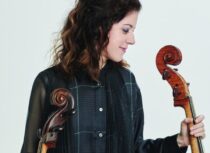The Chan Centre for the Performing Arts
Elinor Frey, Cello
Today, the five-string cello is treated as an exotic and rarely-played cousin of the standard cello. However, in the 17th and 18th centuries it was simply one of the many instruments used in the family of bass violins and was particularly important for virtuosic sonatas and solos. This programme centres around the five-string cello’s most enduring work, Bach’s Sixth Solo Cello Suite (BWV 1012).
Each movement reveals the instrument’s incredible versatility and remarkable colours. Elinor Frey explores these qualities further through two newer works, “Guided By Voices” by Scott Godin (based on “O Vis Aeternitatis” of Hildegard von Bingen) and “With concord of sweet sounds” by Isaiah Ceccarelli.
This concert is generously supported by Mark De Silva and Dr. Katherine E. Paton
Please note that this concert will be filmed.
Programme
Scott Edward GODIN (b. 1970)
Guided By Voices (2014-15)
Isaiah CECCARELLI (b. 1978)
With concord of sweet sounds (2015)
J.S. BACH
Suite no. 6 en re major pour violoncelle seul / in D major for violoncello solo [BWV 1012]
Prélude
Allemande
Courante
Sarabande
Gavotte I & II
Gigue
Programme Notes
Guided By Voices (2014) – Scott Edward Godin
Commissioned by Elinor Frey
et ipsum verbum tuum induit carnem
in formatione illa que educta est de Adam.
Vis aeternitatis
and your very Word calls forth flesh
in the shape which was drawn from Adam.
Power of Eternity
“O Vis Aeternitatis”
Saint Hildegard of Bingen (1098 – 1179)
This new work for five-string cello draws inspiration from the life and oeuvre of Saint Hildegard of Bingen, a unique and perhaps unsettled individual who found solace within her art. At the age of three Hildegard saw her first vision, an experience she referred to as “The Shade of the Living Light.” She continued to have these visions throughout her life, and in 1141, at the age of 42, Hildegard received what she believed to be an instruction from God, to “write down that which you see and hear,” prompting an outpouring of theological and scientific texts, poems, and songs in the remaining years of her life.
guided by voices exploits the obsessiveness found within recurring melodic units of Hildegard’s music, deconstructing these units before reconstructing them in a new musical framework. This work pays homage to Ensemble Sequentia’s performance of “O Vis Aeternitatis,” attempting to create resonances between musical entities past and present. These resonances are made possible through this wonderful instrument, which allows a vibrant interplay between the outer registers (the relationship between heaven and earth, or the conversation between Hildegard and God, interrupted by the “in-between”). In guided by voices I hope to reveal the wonderful colours of the instrument, whether they be obsessive declarations and responsorials of the lowest register, whispers and echoes in the middle, or joyful canticles of ecstasy in the piccolo register. This piece is dedicated in friendship and admiration to Elinor Frey, whose energy and musicality gave me the strength to write this work, and pays homage to the wonderful Barbara Thornton, founder of Sequentia.
Scott Edward Godin (b. 1970) began his musical training on piano, completing a Bachelor of Music Degree with Helmut Brauss at the University of Alberta. By winning the Johann Strauss Competition, Scott was able to study in Vienna, Austria with internationally renowned pianist Paul Badura-Skoda. He completed a Doctoral Degree in Musical Composition in June 2003 with John Rea at McGill University in Montréal, Québec. His music has been performed throughout Canada, Europe, Mexico, and the United States. Accolades include the 2007 Joseph Stauffer Prize for Composition (Canada), finalist in the 1999 Gaudeamus Competition (Holland), finalist in the 1999 Canadian Broadcasting Corporation Young Composers’ Competition, five prizes in SOCAN Young Composers Competitions (Canada), prizewinner for German Radio in the 1997 NRW Symposium (Germany), and eight compact disc releases. Scott has worked with various ensembles and soloists, including ensemble KORE (Montréal), la Société de la Musique Contemporaine du Québec (Montréal), ensemble de ereprijs (Apeldoorn, Holland), Orkest De Volharding (Amsterdam, Holland), Continuum (Toronto), Arraymusic (Toronto), and the Windsor Symphony Orchestra. Scott has been Visiting Assistant Professor in Theory and Composition at both Memorial University (St. John’s, Newfoundland) and Dalhousie University (Halifax, Nova Scotia) and currently lives in Lethbridge, Alberta.
With concord of sweet sounds (2015) – Isaiah Ceccarelli
Commissioned by Elinor Frey
My goal when I sit down to compose is to move around my music’s clear components – melody, harmony, and rhythm – in carefully timed, creative, and pleasing ways. I trust my own ear and try to let the music say what needs to be said in a given amount of time.
With concord of sweet sounds is written for Elinor Frey, one of the finest and most hard-working musicians I know, and was premiered in the exceptionally resonant nave of the Église du Gesù in Montréal in April 2015. It highlights the relationships between several sweet intervals that I find particularly gratifying and employs four of the five open strings of Elinor’s cello. It is essentially a continuo for some absent, slow melody. If you listen closely, bits of that melody pop up here and there. There is no artifice: tuning, timing, and listening are the essential elements.
Isaiah Ceccarelli (b. 1978) is a drummer, composer, and occasional singer of very early music. He composes for musicians and ensembles such as Sarah Albu, Architek Percussion, Mira Benjamin, the Bozzini Quartet, Katelyn Clark, the GGRIL, the London Contemporary Orchestra Soloists, Ensemble SuperMusique, TAK, Joshua Zubot (Stretch Wood), and others. He has recorded many albums, and in 2015, he was the artist in residence at the London studio of the Conseil des arts et des lettres du Québec.
Suite no. 6 in D major for violoncello solo [BWV 1012] – J.S. BACH
Today, the five-string cello is treated as an exotic and rarely-played cousin of the standard cello. However, in the seventeenth and eighteenth centuries it was simply one of the many instruments used in the family of bass violins, and was particularly important for virtuosic sonatas and solos. The programme centres around the five-string cello’s most enduring work, Bach’s Sixth Solo Suite (BWV 1012). At the heart of the repertoire of nearly all cellists, Bach’s cello suites are among the most appreciated works of music lovers around the world. The suites highlight how Bach is particularly adept at mixing particular characteristics of the cello. For example, because of its unique range, from the low bass to the soprano, the cello is able to create the illusion of multiple voices, a polyphony inspired by the use of Bach’s harmony and melody, wonderful techniques that intrigue the ear at every moment. The suites were probably composed around 1720 when Bach lived in Cöthen and worked in the service of Prince Leopold, a time when he composed a great deal of secular and instrumental music, including works for solo violin and the famous Brandenburg concertos. For this concert, the main source is the manuscript copy of Anna Magdalena Bach, as no Bach autographs survive. For the sixth suite, Bach specified a five-string instrument in the manuscript and that this fifth string be tuned to e’, as opposed to d’ which was the more typical tuning. The extended range of the cello brings the music into a joyful and captivating higher register; each movement reveals the instrument’s incredible versatility and remarkable colours.

Elinor Frey, Cello
Elinor Frey is a leading Canadian-American cellist, gambist, and researcher. Her albums on the Belgian label Passacaille and Canadian label Analekta – many of which are world premiere recordings – are the fruit of long collaborations with artists such as Suzie LeBlanc, Marc Vanscheeuwijck, and Lorenzo Ghielmi, as well as with composers including Maxime McKinley, Linda Catlin Smith, Christian Mason, and Lisa Streich. Elinor’s recording of cello sonatas by Giuseppe Clemente Dall’Abaco received a Diapason d’Or and her critical editions of Dall’Abaco’s cello music is published in collaboration with Walhall Editions. Early Italian Cello Concertos, her album in collaboration with Rosa Barocca orchestra, won the 2023 JUNO Award for Classical Album of the Year (small ensemble).
Elinor is the artistic director of Accademia de’ Dissonanti, an organization for performance and research, and she has performed throughout the Americas and in Europe in recital and with numerous chamber ensembles and orchestras (Constantinople, Les idées heureuses, Il Gardellino, Tafelmusik, Pacific Baroque Orchestra, etc.). In March 2023, she performed Boccherini and Sammartini concertos with the Australian Brandenburg Orchestra.
Recipient of dozens of grants and prizes supporting performance and research, including the US-Italy Fulbright Fellowship (studying with Paolo Beschi in Como, Italy) and a recent research residency at the Orpheus Institute in Ghent, Elinor holds degrees from McGill, Mannes, and Juilliard. She teaches Baroque cello and performance practice at McGill University and the Université de Montréal and is a Visiting Fellow in Music (2020–2023) at Lady Margaret Hall, Oxford University. Frey was awarded Québec’s Opus Prize for “Performer of the Year” in 2021.



